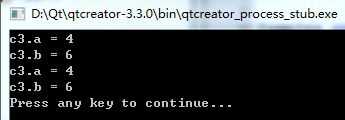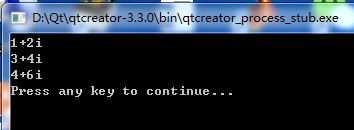标签:过程 原则 opened 赋值操作符 为什么 占位参数 结果 bre 打印
操作符重载为操作符提供不同的语义

#include <iostream> using namespace std; struct Complex { int a; int b; }; int main() { Complex c1 = {1,2}; Complex c2 = {3,4}; Complex c3 = c1 + c2;//编译出错 cout << "Press any key to continue..." << endl; cin.get(); return 0; }
上个例子中,不能用“+”直接操作两个结构体,改动一下,提供一个函数。

//增加一个add函数 #include <iostream> using namespace std; struct Complex { int a; int b; }; Complex add(const Complex& c1,const Complex& c2) { Complex ret; ret.a = c1.a + c2.a; ret.b = c1.b + c2.b; return ret; } int main() { Complex c1 = {1,2}; Complex c2 = {3,4}; Complex c3 = add(c1,c2);//编译出错 cout<<"c3.a = "<<c3.a<<endl; cout<<"c3.b = "<<c3.b<<endl; cout << "Press any key to continue..." << endl; cin.get(); return 0; }

C++中操作符重载的本质
C++中通过operator关键字可以利用函数拓展操作符,operator的本质是通过函数重载实现操作符重载。

//把add替换为“operator+" #include <iostream> using namespace std; struct Complex { int a; int b; }; Complex operator+ (const Complex& c1,const Complex& c2) { Complex ret; ret.a = c1.a + c2.a; ret.b = c1.b + c2.b; return ret; } int main() { Complex c1 = {1,2}; Complex c2 = {3,4}; Complex c3 = operator+ (c1,c2); cout<<"c3.a = "<<c3.a<<endl; cout<<"c3.b = "<<c3.b<<endl; c3 = c1 + c2; cout<<"c3.a = "<<c3.a<<endl; cout<<"c3.b = "<<c3.b<<endl; cout << "Press any key to continue..." << endl; cin.get(); return 0; }

operator关键字拓展的操作符应用到类。
利用友元friend关键字可以例外的开放private声明的类成员的使用权限

//友元friend和全局函数 使操作符重载应用与类 #include <iostream> using namespace std; class Complex { int a; int b; public: Complex(int a=0,int b=0) { this->a = a; this->b = b; } int getA() { return a; } int getB() { return b; } friend Complex operator+ (const Complex& c1,const Complex& c2); }; Complex operator+ (const Complex& c1,const Complex& c2) { Complex ret; ret.a = c1.a + c2.a; ret.b = c1.b + c2.b; return ret; } int main() { Complex c1(1,2); Complex c2(3,4); Complex c3 = c1 + c2; cout<<"c3.a = "<<c3.getA()<<endl; cout<<"c3.b = "<<c3.getB()<<endl; cout << "Press any key to continue..." << endl; cin.get(); return 0; }

以上是“+”操作符,接下来重载“<<”操作符

//左移操作符重载 #include <iostream> using namespace std; class Complex { int a; int b; public: Complex(int a=0,int b=0) { this->a = a; this->b = b; } int getA() { return a; } int getB() { return b; } friend Complex operator+ (const Complex& c1,const Complex& c2); friend ostream& operator<< (ostream& out,const Complex& c); }; Complex operator+ (const Complex& c1,const Complex& c2) { Complex ret; ret.a = c1.a + c2.a; ret.b = c1.b + c2.b; return ret; } ostream& operator<< (ostream& out,const Complex& c) { out<<c.a<<"+"<<c.b<<"i"; return out;//返回ostream类型的out 是为了能连续输出 } int main() { Complex c1(1,2); Complex c2(3,4); Complex c3 = c1 + c2; //cout<<c1; -> operator<<(cout,c1) 如果没有返回cout的话,不能接着输出endl cout<<c1<<endl;//->((operator<<(cout,c1)))<<endl; cout<<c2<<endl; cout<<c3<<endl; cout << "Press any key to continue..." << endl; cin.get(); return 0; }

小结:
1、操作符重载的本质是通过函数扩展操作符的语义 2、operator关键字是操作符重载的关键
3、friend关键字可以函数或类开发访问权限 4、操作符重载遵循函数重载的规则
通过operator关键字能够讲操作符定义为全局函数,操作符重载的本质就是函数重载,那么类的成员函数是否可以作为操作符重载的函数?

#include <iostream> #include <cstdlib> using namespace std; using namespace std; class Complex { int a; int b; public: Complex(int a,int b) { this ->a = a; this ->b = b; } int getA() { return a; } int getB() { return b; } Complex operator+ (const Complex& c2); friend ostream& operator<< (ostream& out,const Complex& c); }; Complex Complex::operator+ (const Complex& c2) { Complex ret(0,0); ret.a = this->a + c2.a; ret.b = this->b + c2.b; return ret; } ostream& operator<< (ostream& out,const Complex& c) { out<<c.a<<" + "<<c.b<<"i";//数学里的虚数表示法 return out;//考虑c++标准库重载的左移操作符支持链式调用,所以要返回cout,如果不返回,则不能接着返回endl了; } int main(int argc,char *argv[]) { Complex c1(1,2); Complex c2(3,4); Complex c3 = c1 + c2;//->c3 = c1.operator+(c2) cout<<c1<<endl; cout<<c2<<endl; cout<<c3<<endl; cout << "Press the enter key to continue ..."; cin.get(); return EXIT_SUCCESS; }
输出结果一样。
用成员函数重载的操作符比全局操作符函数少一个参数,即左操作符,而且不需要friend。
问题来了,什么时候用全局的函数重载,什么时候有成员函数重载。
1,当无法修改左操作数的类时,使用全局函数进行重载 2,=,[],(),->操作符只能通过成员函数进行重载。

//Array.h #ifndef ARRAY #define ARRAY class Array { private: int mLength; int* mSpace; public: Array(int length); Array(const Array& obj); int length(); ~Array(); int& operator[] (int i); Array& operator= (const Array& obj); bool operator== (const Array& obj); bool operator!= (const Array& obj); }; #endif // ARRAY //Array.c #include "array.h" Array::Array(int length) { if(length < 0) { length = 0; } mLength = length; mSpace = new int[mLength]; } Array::Array(const Array &obj) { mLength = obj.mLength; mSpace = new int[mLength]; for(int i = 0;i<mLength;i++) { mSpace[i] = obj.mSpace[i]; } } int Array::length() { return mLength; } Array::~Array() { mLength = -1; delete[] mSpace; } int& Array::operator[] (int i)//作为左值的调用语句返回的必须是引用 { return mSpace[i]; } Array& Array::operator= (const Array& obj)//返回Array的引用是为了可以连续赋值 { //a3 = a2 = a1;->a3 = a2.operator=(a1); delete[] mSpace;//先释放自己的原有的堆空间 因为接下来要申请 mLength = obj.mLength; mSpace = new int[mLength]; for(int i = 0;i<mLength;i++) { mSpace[i] = obj.mSpace[i]; } return *this; } bool Array::operator== (const Array& obj) { bool ret = true; if(mLength==obj.mLength) { for(int i=0;i<mLength;i++) { if(mSpace[i] != obj.mSpace[i]) { return false; break; } } } else { ret = false; } return ret; } bool Array::operator!= (const Array& obj) { return !(*this == obj); } //main.c #include <iostream> #include <cstdlib> #include "array.h" using namespace std; int main(int argc,char *argv[]) { Array a1(10); Array a2(0); Array a3(1); for(int i = 0;i<a1.length();i++) { a1[i] = i+ 1; } for(int i = 0;i < a1.length();i++) { cout<<"Element"<<i<<":"<<a1[i]<<endl; } a2 = a1;//-> a2.operator=(a1); //a3 = a2 = a1;//->a3 = a2.operator=(a1); for(int i=0;i<a2.length();i++) { cout<<"Element"<<i<<":"<<a2[i]<<endl; } if(a1 == a2) { cout<<"a1 == a2"<<endl; } if(a3!=a2) { cout<<"a3 != a2"<<endl; } cout << "Press the enter key to continue ..."; cin.get(); return 0; }
为什么要用到赋值操作符重载?
C++编译器会为每个类提供默认的赋值操作符,但默认的赋值操作符只是简单的值复制,一旦有指针类的成员变量则就只复制指针,它们将指向同一片空间,而相应的空间就没用了,所以类中存在指针成员变量时就需要重载赋值操作符
++操作符的重载
++操作符只有一个操作数,且有前缀和后缀的区分。如何重载++操作符才能区分前置运算和后置运算呢?

#include <iostream> #include <cstdlib> using namespace std; using namespace std; class Complex { int a; int b; public: Complex(int a,int b) { this ->a = a; this ->b = b; } int getA() { return a; } int getB() { return b; } Complex operator+ (const Complex& c2); Complex operator ++(int);//占位参数 Complex& operator ++(); friend ostream& operator<< (ostream& out,const Complex& c); }; Complex Complex::operator+ (const Complex& c2) { Complex ret(0,0); ret.a = this->a + c2.a; ret.b = this->b + c2.b; return ret; } ostream& operator<< (ostream& out,const Complex& c) { out<<c.a<<" + "<<c.b<<"i";//数学里的虚数表示法 return out;//考虑c++标准库重载的左移操作符支持链式调用,所以要返回cout,如果不返回,则不能接着返回endl了; } Complex Complex:: operator ++(int) { Complex ret = *this;//先将当前对象做一个备份 /*首先解释++后缀的原理 int a=0; cout<<a++<<endl;则会打印0 且a=1。 为了模拟这个过程则要先保存一个当前值的备份 */ a++;//然后当前对象进行+1操作 b++; return ret;//将备份返回 } Complex& Complex:: operator ++()//为什么要返回引用? { ++a; ++b; return *this; } int main(int argc,char *argv[]) { Complex c1(1,2); Complex c2(3,4); Complex c3 = c1 + c2;//->c3 = c1.operator+(c2) cout<<c1<<endl; cout<<c2<<endl; cout<<c3<<endl; cout << "Press the enter key to continue ..."; cin.get(); return EXIT_SUCCESS; }
为什么不用重载&&和||操作符?
首先在语法上是没有错误的,但最好不要去重载,&&和||的特性是短路。
//短路 int a1 = 0; int a2 = 1; if(a1&&(a1+a2)) { cout<<"Hello"<<endl; } //因为a1=0,则(a1+a2)根本不会执行。这个就是所谓的短路。 //如果重载了&& class Test { int a; public: Test(int i) { this->a = i; } Test operator+ (const Test& obj) { Test ret = 0; ret.a = this->a+obj.a; return ret; } bool operator&& (const Test& obj) { return a&&obj.a; } }; Test t1 = 0; Test t2 =1; if(t1.operator&&(t1.operator+(t2))) { cout<<"Hello"<<endl; } //则会先执行+操作,违反了短路原则。
&&和||是c++中非常特殊的操作符。
&&和||内置实现了短路规则,操作符重载是靠函数重载来实现的,操作数作为函数参数传递,c++的函数参数都会被求值,无法实现短路规则。
标签:过程 原则 opened 赋值操作符 为什么 占位参数 结果 bre 打印
原文地址:http://www.cnblogs.com/Rainingday/p/7574223.html